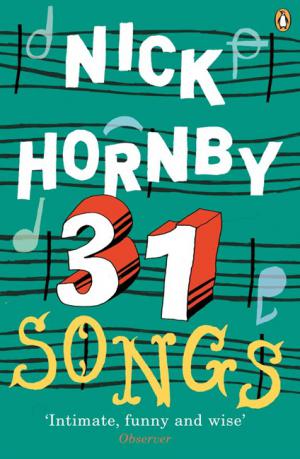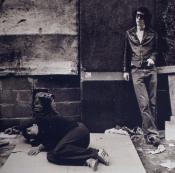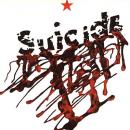Frankie teardrop
Twenty year old Frankie
He's married he's got a kid
And he's working in a factory
He's working from seven to five
He's just trying to survive
well lets hear it for Frankie
Frankie Frankie
Well Frankie cant make it
Coz things are just too hard
Frankie cant make neough money
Frankie cant buy enough food
And Frankie's getting evicted
Oh let's hear it for Frankie
Oh Frankie Frankie
Oh Frankie Frankie
Frankie is so desperate
He's gonna kill his wife and kids
Frankie's gonna kill his kid
Frankie picked up a gun
Pointed at the six month old in the crib
Oh Frankie
(scream)
Frankie looked at his wife
Shot her
(screams)
"Oh what have I done?"
Let's hear it for Frankie
Frankie teardrop
Frankie put the gun to his head
(screams)
Frankie's dead
(screams)
Frankie's lying in hell
(screams)
We're all Frankies
We're all lying in hell
(screams)
Twenty year old Frankie
He's married he's got a kid
And he's working in a factory
He's working from seven to five
He's just trying to survive
well lets hear it for Frankie
Frankie Frankie
Well Frankie cant make it
Coz things are just too hard
Frankie cant make neough money
Frankie cant buy enough food
And Frankie's getting evicted
Oh let's hear it for Frankie
Oh Frankie Frankie
Oh Frankie Frankie
Frankie is so desperate
He's gonna kill his wife and kids
Frankie's gonna kill his kid
Frankie picked up a gun
Pointed at the six month old in the crib
Oh Frankie
(scream)
Frankie looked at his wife
Shot her
(screams)
"Oh what have I done?"
Let's hear it for Frankie
Frankie teardrop
Frankie put the gun to his head
(screams)
Frankie's dead
(screams)
Frankie's lying in hell
(screams)
We're all Frankies
We're all lying in hell
(screams)
envoyé par Alessandro - 12/3/2007 - 23:01
Langue: italien
Traduzione italiana di Frankie Teardrop.
FRANKIE LACRIMEVOLE
Frankie lacrimevole
Frankie ventenne
È sposato ed ha un bambino
Ed ha un lavoro in una fabbrica
Lavora dalle sette alle cinque
Lo fa per sopravvivere
Beh, bravo Frankie
Frankie Frankie
Ma Frankie non ce la fa
perché la situazione sta facendosi troppo dura
Frankie non riesce a fare abbastanza soldi
Non riesce a comprare abbastanza cibo
E Frankie sta per essere sfrattato
Oh, bravo Frankie
Oh, Frankie, Frankie
Oh, Frankie, Frankie
Frankie è così disperato
Sta per uccidere sua moglie e i suoi figli.
Frankie sta per uccidere suo figlio
Frankie ha impugnato una pistola
L'ha puntata verso al bambino di sei mesi nella culla
Oh Frankie
(urla)
Frankie sta guardando sua moglie
Le ha sparato
(urla)
"Oh cosa ho fatto?"
Bravo Frankie
Frankie lacrimevole
Frankie si è puntato la pistola alla testa
(urla)
Frankie è morto
(urla)
Frankie giace all'inferno
(urla)
Siamo tutti Frankie
Giaciamo tutti all'inferno
(urla)
Frankie lacrimevole
Frankie ventenne
È sposato ed ha un bambino
Ed ha un lavoro in una fabbrica
Lavora dalle sette alle cinque
Lo fa per sopravvivere
Beh, bravo Frankie
Frankie Frankie
Ma Frankie non ce la fa
perché la situazione sta facendosi troppo dura
Frankie non riesce a fare abbastanza soldi
Non riesce a comprare abbastanza cibo
E Frankie sta per essere sfrattato
Oh, bravo Frankie
Oh, Frankie, Frankie
Oh, Frankie, Frankie
Frankie è così disperato
Sta per uccidere sua moglie e i suoi figli.
Frankie sta per uccidere suo figlio
Frankie ha impugnato una pistola
L'ha puntata verso al bambino di sei mesi nella culla
Oh Frankie
(urla)
Frankie sta guardando sua moglie
Le ha sparato
(urla)
"Oh cosa ho fatto?"
Bravo Frankie
Frankie lacrimevole
Frankie si è puntato la pistola alla testa
(urla)
Frankie è morto
(urla)
Frankie giace all'inferno
(urla)
Siamo tutti Frankie
Giaciamo tutti all'inferno
(urla)
envoyé par Stan Mall - 20/8/2014 - 18:05

13 - Suicide: Frankie Teardrop
Suicide’s ‘Frankie Teardrop’ is ten and a half minutes of genuinely terrifying industrial noise, a sort of aural equivalent of Eraserhead. Like David Lynch’s film, it conveys a chilling, bleak, monochrome dystopia, full of blood- curdling shrieks and clangs, although I seem to remember that the movie offered the odd moment of respite, an occasional touch of bizarre and malformed hope, whereas ‘Frankie Teardrop’ offers none at all. Here’s a cheerful, bowdlerized version of the story. Frankie works two jobs, but even then he can’t make ends meet, so one night, in despair, he goes back home, murders his wife and children, shoots himself and ends up in Hell. I would, as you might suspect, be lying if I told you that the ten minutes flew by. If you haven’t heard it and you still wish to, set an evening aside, make sure you’re not alone in the room (experiencing the song through headphones, incidentally, will almost certainly result in hospitalization) and take the following day off work. Teenage Fanclub’s ‘Ain’t That Enough’, on the other hand, is a three-minute blast of Byrdsian pop, packed with sunshine and hooks and harmonies and good will. I like the Teenage Fanclub song better. Well, of course I would. It’s more likeable. It’s got a tune and everything, and on the whole I prefer songs with tunes. ‘Frankie Teardrop’ is in all sorts of ways an extraordinary piece of work, but I have no use for it now; I listened to it once upon a time, when I was in my twenties and my life was different, but I probably haven’t played it for a good fifteen years, and I doubt whether l’ll ever play it again. (I didn’t even listen to it in order to write this, and didn’t feel that I needed to. Believe me, the memory has remained vivid.) I don’t want to be terrified by art any more. It’s a strange critical phenomenon that only works of art that are ‘edgy’, or ‘scary’, or ‘dangerous’, are regarded as in any way noteworthy. In my newspaper today, there is an interview with the filmmaker Todd Solondz, whose film Happiness was about paedophilia and provided, it says here, ’a lacerating insight into the hypocrisy of the American middle classes’ - an insight I missed, l’m afraid, when I saw the film. There’s an interview with a band called British Sea Power, who say that ‘there’s so much more you can do than just write songs and sing them’ and stare psychotically into the camera as they are being photographed. There’s a piece about the Jack the Ripper film From Hell, which is headlined ‘Danger: menace at work’. And a rapper called Bubba Sparxxx is taken to task by a journalist because ‘talking about your rural roots isn’t exactly edgy, is it?’ (Well, no. But that, it seems to me, is a flaw inherent in most conversational topics, unless you are heroically single-minded about it, and wax lyrical about the Nazis or terrorist atrocities every time you go out to dinner. Talking is, by and large, one of the safer things one can do.) There are, I suspect, two reasons why so much critical interest is excited by edginess or danger. The first is that critics have to read a lot of books, or see a lot of films, or listen to a lot of music, most of which is bland and indistinguishable, and so anyone who makes a record which features a chainsaw, or a film that runs backwards for twelve hours, is immediately and perhaps understandably praised - in most cases, as weary readers quickly learn if they attempt to share the enthusiasms of their newspaper’s arts pages, overpraised. The second is that reviewing - especially music reviewing - is, for the most part, a young person’s game, and young people tend not to have had a great deal of life experience. Not only have they not lived very much (which is why they tend to get very excited about anyone with a whiff of hard-drug use about them - hard-drug use is frequently misinterpreted by rock critics as a valuable life experience), but they do possibly the safest job there is to do. Indeed, as most of them get their CDs sent to them through the post, CDs they then listen to on their home stereo before filing their reviews via email - they do not even run the risk of being knocked down by a bus. Who wouldn’t, in these circumstances, get wildly overstimulated by an artist who is expressly trying to liven them up a bit? Me, I need no convincing that life is scary. l’m forty-four, and it has got quite scary enough already - I don’t need anyone trying to jolt me out of my complacency. Friends have started to die of incurable diseases, leaving loved ones, in some cases young children, behind. My son has been diagnosed with a severe disability, and I don’t know what the future holds for him. And, of course, at any moment there is the possibility that some lunatic will fly a plane into my house, or a nuclear power plant, or attempt to sprinkle something into our water supply or our Underground trains that will turn us all black as our kidneys shrivel up in our bodies. So let me find complacency and safety where I can, and please forgive me if I don’t want to hear 'Frankie Teardrop’ right now. ‘All these years later and Suicide still feels like a shot in the head,’ an enthusiastic reviewer remarked when their first album was re-released; a couple of decades ago, that would have been enough to make me want to buy it. (’A shot in the head! Wow! Even The Clash only felt like a kick!’) Now, however, I have come to the conclusion that I don’t want to be shot in the head, and so I will avoid any work of art that sets to re-create that particular experience for me. It’s a peculiarly modern phenomenon, this obsession with danger. And, in the end, it’s impossible not to conclude that it has been borne out of peacetime and prosperity and over-education. Would the same critic have told someone coming back from the Somme that a piece of music ‘feels like a shot in the head’, one wonders? And if he did, would he really have expected the chap to go charging off to his local music emporium? It is important that we are occasionally, perhaps even frequently, depressed by books, challenged by films, shocked by paintings, maybe even disturbed by music. But do they have to do all these things all the time? Can’t we let them console, uplift, inspire, move, cheer? Please? Just every now and then, when we’ve had a really shitty day? I need somewhere to run to, now more than ever, and songs like ‘Ain’t That Enough’ is where I run. ‘We are all Frankies’, Suicide concluded at the end of their magnum opus, but they didn’t mean it, really, unless they were dafter than they let on. (In what sense have we killed our families and then turned the gun on ourselves, even metaphorically?) And if we were all Frankies, what would we rather listen to? Blood-curdling re-creations of our miserable and unbearable existence, or something that offered a brief but precious temporary respite? That’s the real con of shock-art: it makes out that it’s democratic, but it’s actually only for those who can afford it. And some of us, as we get older, simply find that we don’t have that much courage to spare any more. Good luck to you if you have, because it means that you have managed to avoid more or less everything that life has to throw at you, but don’t try to make me feel morally or intellectually inferior.
dq82 - 26/11/2015 - 10:04
Questa andrebbe inserita nel percorso La guerra del lavoro ma anche, forse, nel nuovo Non Dio: decido io, e non per il nome del duo che la compose nell'ormai lontano 1977...
B.B. - 17/5/2020 - 09:50
×
![]()









(testo tratto da Song Meanings)
dalla scheda di Claudio Fabretti su (Ondarock)
(Alessandro)